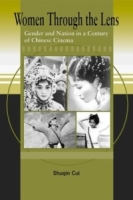| Women Through the Lens: Gender and Nation in a Century of Chinese Cinema артикул 10594d. |
 |
Book DescriptionGender and nation have often served as narrative subjects and visual tropes in Chinese cinema The intersections between the two that occur in cinematic representation, however, have received little critical attention Women through the Lens raises the question of how gender, especially the image of woman, acts as a visual and озенж discursive sign in the creation of the nation-state in twentieth-century China Tracing the history of Chinese cinema through the last hundred years from theperspective of transnational feminism, Shuqin Cui reveals how women have been granted a "privileged visibility" on screen while being denied discursive positions as subjects In addition, her careful attention to the visual language system of cinema shows how "woman" has served as the site for the narration of nation in the context of China's changing social and political climate Placing gender and nation in a historical framework, the book first shows how early productions had their roots in shadowplays, a popular form of public entertainment These films were soon supplanted by cinematic narratives meant to further the causes of social reform and strident nationalism As Leftist filmmaking turned to the female image to signify a motherland suffering foreign invasions as well as domestic afflictions, gender and nation became inextricably intertwined in the cinematic representation of China In examining the "Red Classics" of socialist cinema as a mass cultural form, the book shows how the utopian vision of emancipating the entire proletariat, women included, produced a collective ideology that declared an end to gender difference Sex and desire cannot be eradicated, however, and one of the most valuable contributions of this work is its consideration of the fate of gender difference in a milieu of official suppression The emergence of New Wave films brought heightened international attention to Chinese cinema Filmmakers became keenly aware of visuality as a language system as they experimented with modes of representation Cui documents and discusses the cinematic spectacle of woman as essential to such widely popular films as Chen Kaige's "Farewell My Concubine" and Zhang Yimou's "Ju Do " In these films, the screen image of the Chinese woman is both nationalized and sexualized, and for international audiences she is the exotic and erotic other, the image of China Finally, the author brings a feminist perspective to the issues of gender and nation by turning her attention to women directors and their self-representations She reveals a concealed female identity at the margins where women directors attempt to inject female consciousness and perspective even as they submit to the conventions necessary to get their films produced She concludes that if Chinese women continue to count on the promises of nationalist discourse for their emancipation, they may fail to realize that the need to free feminism from nationalist narratives is a prerequisite for freeing oneself Well conceived and intelligently written, Women through the Lens will appeal to scholars and students in the fields of film, gender, and Asian studies, and to general readers interested in Chinese cinema. Настольная2003 г 304 стр ISBN 0824825322. |